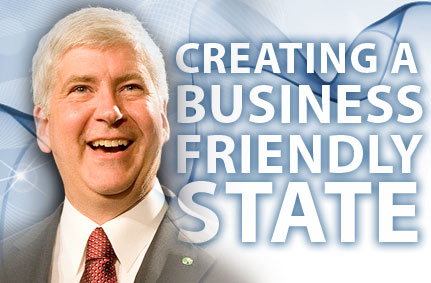
Governor
Rick Snyder
***
It's Time For Financial Transaction Tax
***
But two years later, confronting one of the automobile-addicted state’s most visible problems — crumbling roads — Snyder has roiled conservatives by calling for a major tax increase.
He has proposed boosting the gasoline tax from 19 cents to 33 cents a gallon and hiking car license plate fees by 60 percent, firmly grabbing what many politicians consider a third rail for consumers — gasoline prices.
“This is common sense,” he declared during his budget proposal, adding, “we need to make this investment.”
Although a break from the GOP’s anti-tax ideology, Snyder’s move shows a dicey willingness among some Republican officials to begin raising more revenue. They are a distinct minority in the more than two dozen states the party dominates. But those treading this path are governors facing difficulty delivering basic services, especially roads, with budgets that are strained and must be balanced.
They insist there are actually some taxes that government should rely on more — and that even Republicans can embrace.
In Virginia, GOP Gov. Bob McDonnell recently won approval for overhauling his state’s highway maintenance system by raising diesel and retail sales taxes and creating a mechanism for a potential future gasoline tax hike. Pennsylvania Republican Gov. Tom Corbett has called for increasing a wholesale gasoline tax, with most or all of the increase passed to drivers.
Conservative economists disdain higher tax rates for siphoning off money they say would be available for economic activity. But gasoline taxes, some Republican officials say, are a lesser evil because the money traditionally doesn’t wind up in general spending, but rather in building infrastructure, which helps boost economic development.
They also like the simple idea behind it. “It’s a user fee,” Snyder said. “If you use the roads more, you should pay more. If you use the roads less, you should pay less.”
People in states with a higher gasoline tax can actually come out ahead financially, said Patrick Anderson, a Michigan economist and limited-government proponent. “If the money builds infrastructure they use to earn money, you can end up in a better place,” he said.
But the proposal has stirred turmoil among the state’s Republicans, especially those expecting a more traditional cut-other-spending approach for funding core needs.
Snyder has the backing of the business lobby, which complains that key trade routes to Canada, such as Interstates 94 and 69, are a patchwork of potholes and cracks.
“We understand the difference between investing in an asset that has value and adds value to economic activity as opposed to general spending,” said Rich Studley, president of the Michigan Chamber of Commerce.
oad investments have felt the effect of motorists driving less and using more fuel-efficient cars, which cut into fuel tax revenues. The state’s main transportation fund is at its lowest level in 30 years when adjusted for inflation.
Snyder wants $1.2 billion in new revenue — nearly one-third over current spending — for upgrading the most commercially important corridors. The system needs a permanent fix — one that doesn’t involve taking from other programs, he says.
But many in Michigan’s GOP-controlled Legislature flatly reject a tax hike.
“No way,” said Sen. Jack Brandenburg, a Republican from Harrison Township north of Detroit. Those who want more road money can “not go to the people for it.”
The hike in the gasoline tax and vehicle fees would cost families an average of $120 more a year per vehicle.
“A hundred and twenty bucks is a lot, especially for minimum-wage people,” said April Steen, 28, a Lansing nurse who said potholes had bent her rims three times.
Conservative lawmakers are calling for freezing spending on other programs, tapping other funds, privatizing rest areas and leasing advertising space or selling naming rights on state property. The fight may not be resolved until lawmakers’ self-imposed deadline for a budget deal in June.
Roads are also a priority in many other states, but Republican governors have been avoiding taxes. In neighboring Wisconsin, Republican Gov. Scott Walker has proposed spending $500 million more on transportation projects over two years by selling state property, including power plants, to help pay for bonds. Indiana is weighing how to shift money from other parts of its budget.
Pennsylvania’s Corbett proposed a tax increase after transportation revenue fell more than $3.5 billion behind the amount needed for bridge and highway repairs, a gap projected to double within 10 years. With the GOP in control of the Legislature, the future of Corbett’s funding plan is unclear.
Virginia has enjoyed budget surpluses in recent years, but not in its transportation budget. Maintenance and repair costs exceed $1 billion a year, leaving little for projects to alleviate the congestion worsening around Washington, D.C., because of the area’s growth.
In Michigan, Democrats also are concerned about Snyder’s tax hike proposal, mostly because of its impact on the state’s low-income residents.
“It seems about the least popular thing he could have put on the table,” said Senate Minority Leader Gretchen Whitmer, a Democrat from East Lansing.
___
Associated Press writers Peter Jackson in Harrisburg, Pa., and Bob Lewis in Richmond, Va., contributed to this report
___
Email David Eggert at deggert(at)ap.org and follow him at http://twitter.com/DavidEggert00
No comments:
Post a Comment